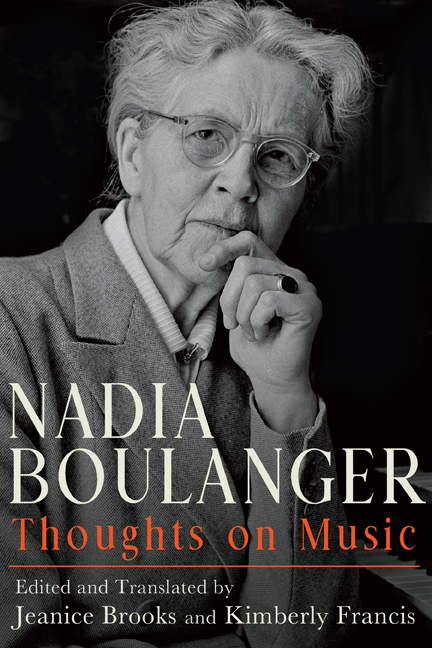Book contents
- Frontmatter
- Contents
- List of Illustrations
- Acknowledgments
- Editorial Apparatus and Critical Notes
- Note on Translations
- List of Abbreviations
- Timeline of Nadia Boulanger’s Life
- Introduction
- Part One Journalism, Criticism, Tributes
- Part Two Lectures, Classes, Broadcasts
- Bibliography of Nadia Boulanger’s Published Writing
- General Bibliography
- Index
“Le Traité de’improvisation de Marcel Dupré” Le Monde Musical 37, no. 1 (January 1926): 7 (complete text)
Published online by Cambridge University Press: 15 October 2020
- Frontmatter
- Contents
- List of Illustrations
- Acknowledgments
- Editorial Apparatus and Critical Notes
- Note on Translations
- List of Abbreviations
- Timeline of Nadia Boulanger’s Life
- Introduction
- Part One Journalism, Criticism, Tributes
- Part Two Lectures, Classes, Broadcasts
- Bibliography of Nadia Boulanger’s Published Writing
- General Bibliography
- Index
Summary
Marcel Dupré's Treatise on Improvisation
Write a treatise on “improvisation”? First of all, such a thing might, strictly speaking, seem impossible, as the essential factor of improvisation is particularly mysterious and hard to grasp.
Patient introspection undoubtedly put Marcel Dupré on the right path. By giving up on explaining what “improvisation” is, he enumerated the ways to improvise; without trying to say “why,” he explained “how”; and, acting as a teacher and a psychologist, as well as a humanist, he solved the problem.
It was difficult to make this decision, because in order to achieve the goal, it had to seem as if it had been forgotten. In a field where fantasy, sensibility, and emotion reign, Marcel Dupré intentionally established “order.” Avoiding chimeras, he focused on facts and realities, and without concerning himself with what he knew to be outside the realm of pedagogy—the “gift” the student must have inside himself, and about which the teacher can do nothing—he established a method allowing for the logical acquisition of a complete technique.
By explaining the reasons motivating obedience and those justifying independence, he has provided the young musician with the means to understand these reasons and to know when to obey or to free himself in turn.
With an extremely refined understanding of the human heart and mind, Marcel Dupré strived to make the discipline strict enough that, having been forced to obey it, the student would feel the need to escape from it, yet also to leave it flexible enough for the student to love it. He was able to demonstrate the confidence that it brings, the control that it exercises, and the freedom that it ultimately gives.
From all these short, concise, and simple phrases, which at first resemble formulae, emerges a critique of verbiage, of vain effusions, of lack of consciousness, of misunderstood sincerity, which goes very far. In principle, one is discussing only technique, in fact one grasps pure ideas, and the lesson becomes generalised enough to have an effect on the very education of the mind (if one assumes that, after hearing all that they have been told, students have enough curiosity and courage to transpose and apply it).
- Type
- Chapter
- Information
- Nadia BoulangerThoughts on Music, pp. 191 - 192Publisher: Boydell & BrewerPrint publication year: 2020



